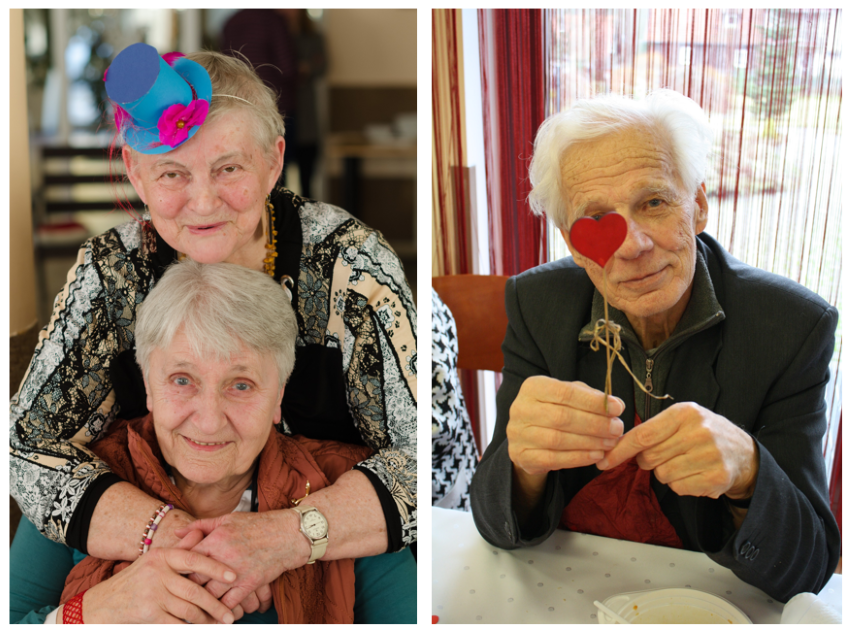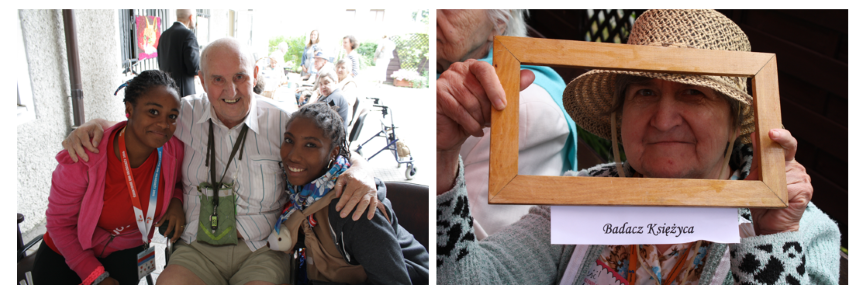We talk to Marta Szulc from the Gdańsk branch of Caritas about the power of good that comes from contact with people who have passion and energy to act, about breaking the stereotypical view of seniors and why it is worth taking part in events presenting the behind-the-scenes work of one of the oldest charity organizations in Poland.
Monika Bogdanowicz (Communication Olivia Business Centre): Is good a scarce value today? What is your experience of working with different groups of people in need of help and those who provide this help?
Marta Szulc (Secretary of the Board of Caritas of the Archdiocese of Gdansk): The good, we are convinced, is in each of us. So as many people as there is GOOD. The enormity of issues, living and social spaces that Caritas in Gdańsk deals with often gives us the impression that there is not too much good around us. Children who don’t have lunch at school or socks without holes; Residents of our day-care centers, seniors who seek help in our facilities to get rid of the feeling of loneliness, or homeless and hungry people. It would seem that they have not met enough good people on their way, since they are looking for help from us. But it is enough to come for a moment to any Caritas facility, we will very quickly realize that these are places where there is goodness and in abundance. This goodness, I would like to emphasize, is in each of us: in our mentee, employee, volunteer. In me and in you. You just have to find a way to get them out sometimes.
MB: What does it take to be a good person in the modern world?
Mfa: I wouldn’t limit being good to time or place. Being good is always needed. What characterizes the modern world is a huge rush for… Well, we don’t know exactly what he is for. However, what I know for sure is that every situation when I can stop for a moment and do something good gives me great joy. And that’s true for everyone. I encourage you to give it a try today. What can you do? To smile at the conductor on the train, to say good morning to your neighbour… Let’s start small.

Fig. Caritas of the Archdiocese of Gdansk
MB: How do you build active communities of people who want to share their time, experience or passion with others?
Mfa: The most difficult thing is to break certain stereotypes, prejudices, attitudes. I’ve been working in Caritas in Gdańsk for over 13 years and I’ve learned to start with a meeting. Do you want to devote your time and passion to seniors? I invite you to one of our facilities. Stay with us for a while, let’s get to know each other. You will quickly realize that not only do you have something to share, but also seniors have a lot of experience and passions that they are happy to share. It is important to be and act together.
MB: You are starting a series of meetings that will be organized in the Olivia Business Centre. Where did the idea for such meetings come from and what goals do you set for yourself with this formula?
Mfa: The idea had been maturing for a few years, maybe two. I’ll pick up on what I said earlier, we’d love to meet the people who work in this space. To be together for a while, to spend time together. Goals: to get to know each other better, to share the best of ourselves. I do not hide the fact that we would also like to provide our employees with information that they may be able to use themselves one day, e.g. who can benefit from our help, how they can join us, e.g. as a volunteer.
We would like to show that Caritas in Gdańsk has over 300 employees, over 20 facilities, including the Hospice House, which is currently preparing a charity ball, to which we invite you, is m.in. Single Mother’s Home, several day-care centers, Occupational Therapy Workshops, branches of the Care and Treatment Centre, Caritas Circle School, A soup kitchen for the homeless, community nurses, a Social Welfare Home, a day care home, a Day Care Home for the Elderly…
We would really like to show the backstage of “Caritas”, share the good that is happening in our country, maybe help those who have not found it yet?
MB: Who are the meetings addressed to and what can we expect during them?
MSz: The meeting is addressed to those who work in Olivia’s space. We also invite our pupils and co-workers to take part in them. During them, we would like to show in an interesting way what is happening in our facilities. On Tuesday, January 23rd, we will have a meeting with seniors – it will be really interesting. Personally, I’m looking forward to the “brain gymnastics” classes – a small sample of the classes we carry out for seniors. I’m also looking forward to the photo exhibition. I’ll just say this, our ladies appear on the covers of the catalogues of a very famous Swedish company. It’s really impressive. The first meeting of the series will be dedicated to active, passionate seniors. Since this is our first meeting, I must admit that we, as organizers, feel a certain stage fright.
Our seniors will participate in the meeting and share their best. With your passions, talents, experiences. From talking to Krysia, I know that they can’t wait. We want to show that old age can be beautiful , as evidenced by the photos of our seniors, which were taken during a professional photo session, joyful – which will resonate when singing together, active – this will prove to us m.in. Mr. Kacper, our physiotherapist working with seniors and creative – which will be encouraged by the actors 70+ who prepared the Nativity play. And above all, we want to talk about the fact that old age is also GOOD.

Fig. Caritas of the Archdiocese of Gdansk
MB: How do you manage to activate the potential of these people and what was the biggest surprise you had as part of projects dedicated to seniors?
MSz: Every work with a human being requires… meetings with the latter. I know, I’m repeating myself… Listening to his life story. And then you have to reject schemes, prejudices and make your dreams come true… One of such dreams came true when, while carrying out a photography project with seniors, one of the seniors said in a facility located in the Lower Town: “We have such beautiful pictures – we have to show them to others.” Another added: “We have a gallery in the district – let’s make an exhibition.” At first, I was speechless. But rejecting what limits us, I said, why not? A few weeks later, our seniors had an exhibition at the Laznia Gallery of Contemporary Art in Gdańsk in the Lower Town. The vernissage was a magical time of a dream come true. Wishing you many fulfilled dreams, I invite you once again to a joint meeting!
M.B.: I wish you many good moments and meetings with people who are willing to devote their time and give new, good energy to Caritas.
We invite you to a meeting with seniors in Olivia
–/–
Marta Szulc. Professionally: Secretary of the Board of Caritas of the Archdiocese of Gdańsk (for less than 1.5 years). Previously, the head of Caritas facilities in Gdańsk, among others. Senior Day Home, “Dobra” Day Care Centre, Volunteer Coordinator. She has been working for Caritas in Gdańsk for over 13 years. Education: pedagogue, psychologist. Privately: happy wife of Michał and mother of Antek and Marysia. Passions: gardening with plants, good coffee and chocolate in all its forms.
–/–
Caritas Poland is a charitable institution of the Polish Episcopal Conference. It was reactivated on October 10, 1990. It refers to the tradition of charitable work of Caritas from before 1950. It operates on the basis of the Act of 17 May 1989. on the relationship between the State and the Catholic Church. Since 2004, it has had the status of a public benefit organization (KRS 0000198645). Caritas Poland coordinates the work of 44 diocesan and archdiocesan Caritas in Poland, supporting them in the performance of their tasks. In addition, Caritas Poland plays a representative role (acting on behalf of Caritas in Poland at the national and international level), formation and information (conducting trainings, symposia, recognizing the areas and scale of poverty in Poland), operational (initiating nationwide fundraising for Polish and abroad, organizing humanitarian transports, providing immediate and long-term, material, psychological, legal and financial assistance to the unemployed, the homeless, the sick, the elderly, children with disabilities. poor families, as well as immigrants and refugees).
The beginnings of Caritas’ activity in Poland were mainly the distribution of material gifts received from abroad (martial law). However, she quickly changed her strategy and started providing charitable aid thanks to funds obtained from people of good will and institutions. Caritas has established professional care and educational facilities: Caritas Care Stations, rehabilitation centers, nursing and care facilities, nursing homes, occupational therapy workshops, Single Mothers’ Homes, soup kitchens for the poor, day-care centers for children and the elderly, etc. In the international arena, he cooperates with the Pontifical Council “Cor Unum” and is a member of Caritas Internationalis and Caritas Europa.




